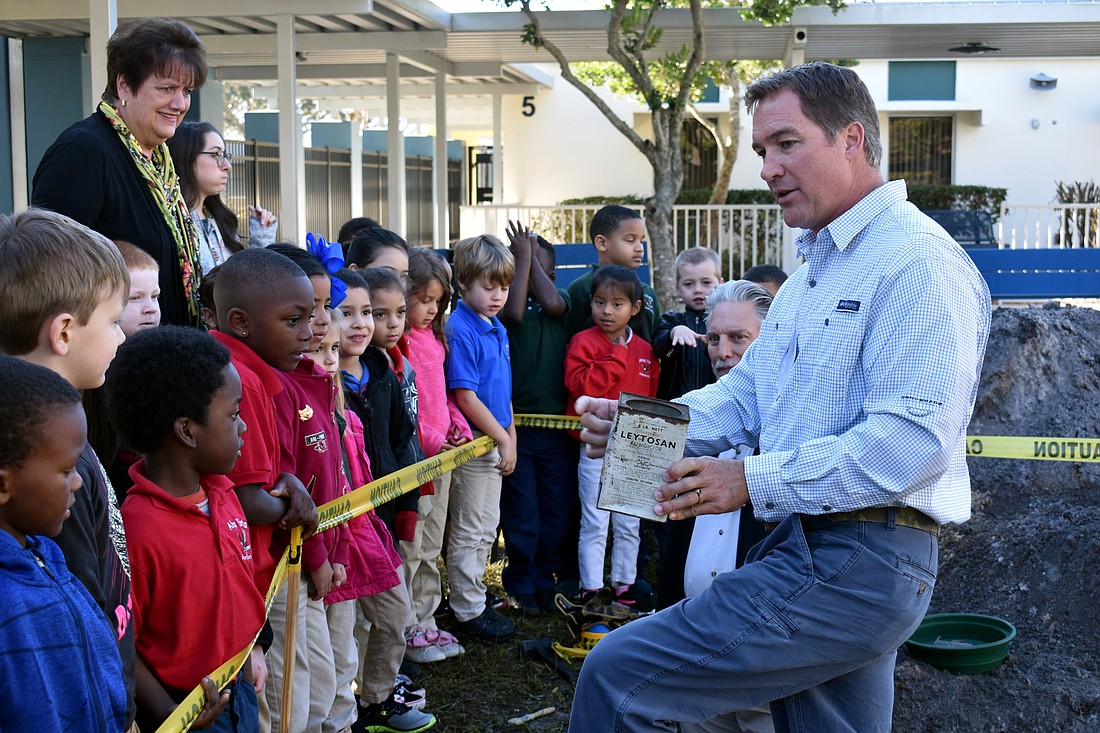- April 19, 2024
-
-
Loading

Loading

As Alta Vista students headed to class Monday, they craned their necks to get a better look at a sizable hole in the courtyard.
The site, which was said to be a historical farm, was filled with different items indicative of a past life, such as oil drums, fertilizer cans and old airplane parts. Armed with shovels and metal detectors, researchers from the University of South Florida inspected the findings.
“Whoa! What is that?” one child exclaimed as another artifact was unearthed.
“I want to use that thing,” another said as the metal detector pinged.
Of course, the site was manufactured by the Education Foundation of Sarasota County to bring immersive scientific learning to students, but to the children who inspected the site, it was real.
“This is about supporting teachers and bringing innovation to the classroom,” said Suzanne Burke, the foundation’s senior director of College Career & Life Readiness. “Going to this extent with the facilities is kind of a big deal, but the kids get really involved, and it shows teachers that they can do something like this in the future. ”
The Education Foundation supports scenarios at various elementary schools each year. At Ashton Elementary in 2019, a meteor struck, and students inspected it.
The idea is to facilitate open inquiry learning, USF professor Mitch Ruzek said.
For this particular project, “H2 … Oh No!” researchers “discovered” scraps from an old crop duster and fertilizer, pesticide and fuel containers, which helped them determine the campus was built on top of a historical farm.
Throughout the week, researchers including Ruzek and USF’s Dana Zeidler and Melanie Kinskey helped students unearth plane parts, farm equipment and old musical instruments.
Researchers processed the area much like hazmat and research teams would do while investigating the possibility of chemicals leaking into the ground.
They then analyzed what the artifacts meant historically or in the context of the environment.
“These projects are great because we can find areas where there’s a learning deficit or that are just not stimulating in a textbook and bring them out here,” Ruzek said. “Here, we turned a lesson about watersheds into so much more than that.”
Based on grade level, the USF research team broke down different lessons for the students. Some younger classes analyzed the soil from the site and planted seeds in their classrooms to monitor growth. Older students plotted charts and graphs to figure out which portion of the site would have the most metal parts in it.
“This really teaches students about authentic inquiry and immersive learning,” Zeidler said. “It challenges students to think critically and ethically.”
Aside from immediate educational impacts, Zeidler said the program also is a way to encourage teachers.
“It’s great because teachers come out here, and they see how excited the students get,” Zeidler said. “The teachers realize they can do activities like this on their own, and they carry these ideas with them into the future after we leave.”
Burke said the foundation tries to put on several scenarios a year, but each one costs about $15,000.
“Hopefully, we are able to secure more funding for them because there is such enthusiasm for these programs from the students, from the teachers, from the parents,” Burke said. “They’re just truly incredible programs.”